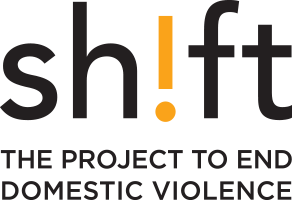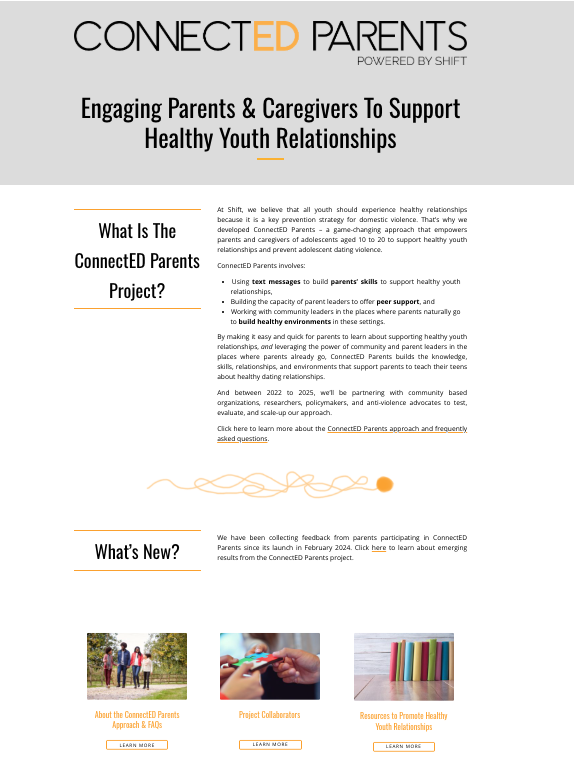CHILDREN, YOUTH AND PARENTS
Rationale
In order to foster and build healthy youth relationships, the contexts in which children and youth live, learn, pray and play must also reinforce healthy youth relationship skills. Promoting healthy relationships (i.e., relationships that are based on trust, mutual understanding, respect and equality) throughout the lifespan is critical to ensuring social well-being in Alberta’s communities. These relationships include those between parents and their children, between friends and peers, between intimate partners, between girls and boys, between all genders, between men and women, and between employers and employees. Consequences of unhealthy relationships include child maltreatment, bullying, adolescent dating violence, domestic violence, intimate partner violence, family violence and elder abuse.


Our Response
Since 2011, Shift has worked in partnership with government, academics, school boards and schools, NGOs and community-based organizations, to advance a primary prevention approach focused on building the capacities and skills to promote healthy youth relationships.

In 2022, Shift received received funding from the Public Health Agency of Canada to test, evaluate, and scale-up ConnectED Parents with community-based organizations, researchers, policymakers, and anti-violence advocates. This project will run from 2022 to 2025.
Currently in Phase 1, we are partnering with community organizations to implement ConnectED Parents. Phase 2 evaluates the impact of ConnectED Parents on promoting healthy youth relationships and preventing adolescent dating violence. In Phase 3, Shift will foster a vibrant community of practice and train new groups to implement ConnectED Parents.
Click here to learn more about ConnectED Parents!
In 2019, Shift designed ConnectED Parents, a comprehensive, gender-transformative approach to prevent adolescent dating violence because this is a key prevention strategy for preventing domestic violence. ConnectED Parents supports parents and caregivers of adolescents aged 10 to 20 in teaching their teens the skills for healthy relationships. ConnectED Parents makes it quick and easy for parents to learn about healthy relationship skills, while building a healthy social environment and support system around them. It includes:
- Delivering informative text messages to enhance parents’ knowledge and skills in teaching their teens about healthy dating relationships,
- Building the capacity of parent leaders to provide peer-to-peer supports, and
- Working with community leaders to build healthy social environments in the places where parents naturally go.
Throughout 2017 and 2018, Alberta’s Ministry of Education invited Shift to a series of consultations to inform the re-design of the kindergarten to grade 12 curriculum, allowing Shift to highlight the need to integrate social-emotional learning in K-12 education. The current draft of the K-4 curriculum (subsequent grades have not yet been drafted) shows that our recommendation was adopted. At the same time, the Werklund School of Education invited Shift to design the healthy youth relationships component of their mandatory Comprehensive School Health course, and approximately 500 Bachelors of Education students complete the course each year.
In 2015, we launched a new graduate certificate MED program titled, Advancing Healthy and Socially Just Schools and Communities in partnership with the Werklund School of Education. The purpose of the certificate program is to assist educators, social workers, health care providers, and other community service workers in building the knowledge, skills, and confidence necessary to develop healthy and socially just learning environments at schools and in the broader community. In 2017, the program received the University of Calgary Teaching Award for Curriculum Development.
From 2012-2015, with funding from SSHRC and the Government of Alberta, Shift led a local initiative with community-based organizations and two local school boards (Calgary Board of Education and Calgary Catholic School District) to identify evidence-based programming that would prevent dating violence and promote healthy relationships with youth. The result: a strategic and coordinated approach to violence prevention for children and youth along with a number of resources and tools for teachers and community based program leaders. For more information about the project’s results, please review the evaluation findings and recommendations.
In 2012, Shift initiated the Alberta Healthy Youth Relationships Strategy (AHYR) aimed at building and promoting healthy relationships with youth across Alberta. The AHYR Strategy focuses on seven key strategies and specifically targets adolescents, adults, parents/families, schools, communities and broader systems. This initiative was lead through a partnership with Western University’s Centre for School Mental Health (previously with CAMH Prevention Science) and PREVNet (Promoting Relationships and Eliminating Violence Network), and the Government of Alberta’s Ministry of Human Services – Family Violence Branch, that focused on scaling three evidence-based programs: Fourth R (Relationships), Healthy Relationships Plus Program (HRPP), and Health Relationships Training Module (HRTM) across the province. Follow the link to see how many teachers, adults and youth have been impacted by this strategy over the last six years. we completed the AHYR Strategy’s focus on scaling-up evidence-based programs in 2018.
In 2011-2013, we collaborated with the Government of Alberta’s Human Services Ministry and partner Ministries to design a provincial framework Family Violence Hurts Everyone: A Framework to End Family Violence in Alberta. The Framework includes a number of strategies aimed at primary prevention including focusing efforts on children and youth, and young adults by building healthy and safe socio-cultural norms and environments. As a result of this work, Shift wrote a position paper on supporting home visitation programs as a domestic violence prevention strategy along with a comprehensive review on programs that prevent child maltreatment.
Projects
Learn more about other projects to develop healthy youth relatioships from Shift.
ConnectED Parents:
By making it easy and quick for parents to develop healthy relationship skills in their children, ConnectED Parents builds the knowledge, skills, and environments that support parents to help prevent adolescent dating violence.



